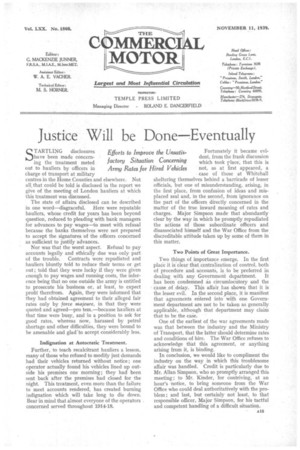Justice Will be Done Eventually
Page 17

If you've noticed an error in this article please click here to report it so we can fix it.
STARTLING disclosures have been made concerning the treatment meted out to hauliers by officers in charge of transport at military centres in the Home Counties and elsewhere. Not alt that could be told is disclosed in the report we give of the meeting of London hauliers at which this treatment was discussed.
The state of affairs disclosed can be described in one word—disgraceful. Here were reputable hauliers, whose credit for years has been beyond question, reduced to pleading with bank managers for advances to pay wages—to meet with refusal because the banks themselves were not prepared to accept the signatures Of the officers concerned as sufficient to justify advances.
Nor was that the worst aspect. Refusal to pay accounts legally and ethically due was only part of the trouble. Contracts were repudiated and hauliers bluntly told to reduce their terms or get out ; told that they were lucky if they were given enough to pay wages and running costs, the inference being that no one outside the army is entitled to prosecute his business or, at least, to expect profit therefrom. Again, they were informed that they had obtained agreement to their alleged fair rates only by force majeure, in that they were quoted and agreed—pro tem.—because hauliers at that time were busy, and in a position to ask for good rates, whereas now, harassed by petrol shortage and other difficulties, they were bound to be amenable and gladlo accept considerably less.
Indignation at Autocratic Treatment.
Further, to teach recalcitrant hauliers a lesson, many of those who refused to modify just demands had their vehicles returned without notice ; one operator actually found his vehicles lined up outside his premises one morning; they had been sent back after the premises had closed for the night. This treatment, even more than the failure to meet accounts rendered, has created burning indignation which will take long to die down. Bear in mind that almost everyone of the operators concerned served throughout 1914-18. Fortunately it became evident, from the frank discussion which took place, that this is not, as at first appeared, a case of those at Whitehall sheltering themselves behind a barricade of lesser officials, but one of misunderstanding, arising, in the first place, from confusion of ideas and misplaced zeal and, in the second, from ignorance on the part of the officers directly concerned in the matter of the true inward meaning of rates and charges_ Major Simpson made that abundantly clear by the way in which be promptly repudiated the actions of those subordinate officers and disassociated himself and the War Office from the discreditable attitude taken up by some of them in this matter.
Two Points of Great Importance.
Two things of importance emerge. In the first place it is clear that centralization of control, both of procedure and accounts, is to be preferred in dealing with any. Government department. It has been condemned as circumlocutory and the cause .of delay. This affair has shown that -it is the lesser evil. In the second place, it is manifest that agreements entered into with one Government department are not to be taken as generally applicable, although that department may claim that to be the case.
One of the earliest of the war agreements made was that between the industry and the Ministry of Transport, that the latter should determine rates and conditions of hire. The War Office refuses to acknowledge that this agreement, or anything arising from it, is binding.
In conclusion, we would like to compliment the industry on the way in which this troublesome affair was handled. Credit is particularly due to Mr. Allan Simpson, who so promptly arranged this meeting ; to Mr. Kinder, for contriving, at an hour's -notice, to bring someone from the War Office who could deal authoritatively with the problem; and last, but certainly not least, to that responsible officer, Major Simpson, for his tactful and competent handling of a difficult situation.




























































